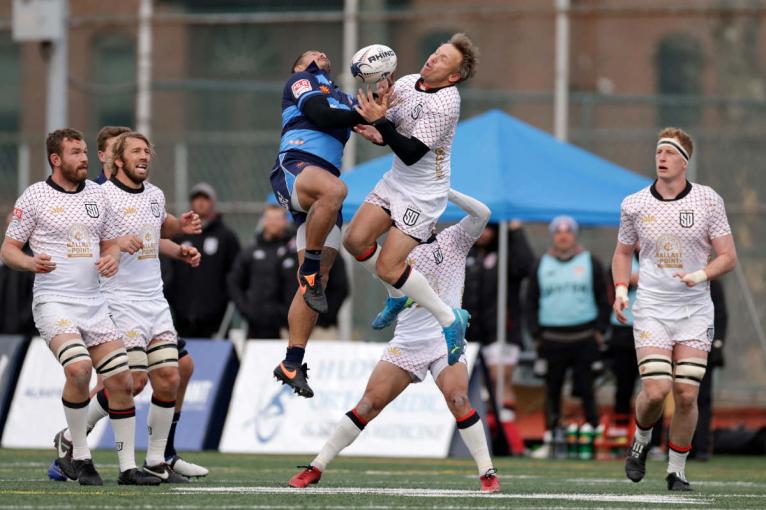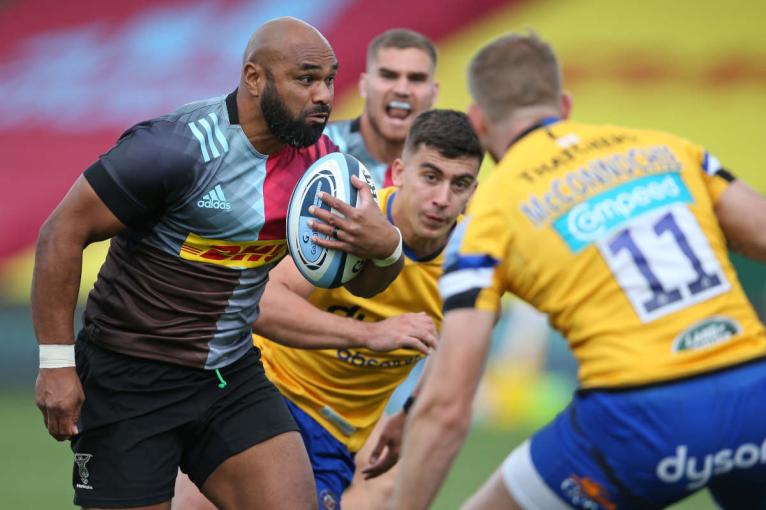The United States aim to reach the semi-finals when they stage the men’s Rugby World Cup in six years’ time. A week on from losing to Spain, the nature of last weekend’s 40-5 home defeat to what was pretty much England’s 3rd XV suggests they have work to do.
The Eagles’ plan to reach their lofty goal is called Moonshot 2031. It is framed on John F Kennedy’s vision of sending an American into space and landing him on the moon.
Plenty of people thought that was impossible but NASA rose to the challenge. They met the soaring scale of their nation’s ambition and pulled it off. Sometimes, looking in from the outside these days, you are left wondering quite how the Americans did it but they managed to do so.
Tasked with taking their own Neil Armstrong leap, do the Eagles really have the remotest chance of reaching a World Cup semi-final?

Chris Robshaw, the former England captain, spent the last two seasons of his career with San Diego Legion in the MLR (Major League Rugby).
He is instinctively a glass-half-full guy, but he thinks it will be a tall order.
“They have a big opportunity and they have six years, but they do have a way to go. It will be a big ask to get to that level,” he said.
“The difference I found was just that understanding. Brought up on the game, we’ve spent hours and hours being trained so that if a player runs like this or steps like that or looks to offload, you’ve seen that picture a lot already, whereas for many of their players they are still evolving that picture.
The more players they can get who have played rugby competitively from a young age, the more benefit it will be to the national side.
“They have the physical side. They are specimens and speedsters – as we’ve seen with the USA Sevens side – but there is a difference between picking a sport up at 16 and picking it up at six.
“Club rugby is starting to become the first sport for some but for a lot of players it was a case of deciding to try their hand at rugby later on, having played high school football thinking they might not make it to the NFL.
“The more players they can get who have played rugby competitively from a young age, the more benefit it will be to the national side.”

While that has to be the long-term aim, USA Rugby are dealing in the medium term with their Moonshot mission. Somehow, they have to hot-house the talent they have in the system already.
The overall quality of a fragmented match against England in Washington was modest. The lightning delays were disruptive, the slippery ball in the humid conditions likewise but from what rugby did take place between the stoppages, it looked as if the US still have a skill deficit to close.
Robshaw has an idea which he thinks might help.
“The MLR is a league that’s growing and the quality is getting better year on year. I believe they do have good people in place running the game now and good club owners – plus a bit of star power with Antoine Dupont buying into Rugby Football Club Los Angeles which always helps.” he said.
“However, the MLR is only a short season – 17 games – and I think a lot of the American players would really benefit from a loan period overseas outside that to get some experience of different rugby environments. It would just broaden their horizons.
“I know it’s important for them to play in the MLR too but think of someone like AJ MacGinty – or Paul Lasike who played at Harlequins – and how much they benefited from playing in Europe.”

The decision to take the 2031 World Cup – and the women’s event two years later – to the US was a bold one. Moving rugby’s greatest events into the world’s biggest sporting market was visionary in one sense but also a risk given the nation’s rugby pedigree.
It opened up the possibility of playing matches in some incredible stadia and in some vibrant cities, yet it also meant taking the gamble that the host nation could turn out to be effectively onlookers at their own party.
A World Cup can survive its hosts falling by the wayside early on but there is no doubt it helps if they can be part of the competition’s story – particularly in a non-rugby country like the USA.
It isn’t necessarily terminal for a tournament to have a host nation that struggles. Robshaw’s England team did not reach the knockout stages of the 2015 World Cup on home soil, but it still went down as one of the best tournaments ever.
A World Cup can survive its hosts falling by the wayside early on but there is no doubt it helps if they can be part of the competition’s story – particularly in a non-rugby country like the USA.
Americans are used to being winners on the sports field. The US public have plenty of choice when it comes to sports they are good at – Scottie Scheffler’s victory at the Open led home a Portrush 1, 2, 3 – without having to latch onto any underdog no-hopers.
So, having been awarded the staging rights to 2031, there is pressure on the Eagles to raise their game.

They are coming from a long way back having failed to qualify for the last World Cup.
Their route into the next one in Australia in 2027 is through the six-team Pacific Nations Cup. Fiji and Japan have already qualified and three out of Samoa, Tonga, Canada and the US will join them this summer.
Whoever finishes bottom will face a last-chance saloon play-off against the runners-up in the South American Championship in September.
It is critical for USA, on their Moonshot journey, that they make it this time.
“They will want that experience of playing at a World Cup behind them,” said Robshaw. “I know they were devastated to miss out on the last World Cup. It is their shop window to show the world what they are about. They will want to be known as a rugby nation so they need to be there.”
Since the first World Cup in 1987, only eight nations have reached a semi-final. They are all established rugby countries. A dark horse has never featured.
No nation on earth has a comparable athlete talent pool, financial resources, training facilities or sports science capabilities. The US also possesses a unique can-do mentality.
Indeed, you have admire their chutzpah that they can pull this off.
What the Eagles are attempting in pursuing a last-four place in 2031 is unprecedented.
Since the first World Cup in 1987, only eight nations have reached a semi-final. They are all established rugby countries. A dark horse has never featured.

In essence, the US are trying to do with Moonshot 2031 what even a country as steeped in the game as Ireland has never managed.
Even if the Eagles end up falling short though, Robshaw has no doubt that World Rugby have made the right call in taking the tournament to the States.
An American World Cup, he predicts, will be a magnificently unique rugby experience.
It will be different – but they are going to sell it, they are going to pump it up and they are all going to get behind it.
“It’s going to be amazing because Americans know how to do sport,” he said.
“France was amazing, Australia is going to be amazing, but we are going into the same markets with those World Cups. It is brilliant to be going to a different audience and letting the Americans put their stamp on it.
“Will it be to everyone’s taste? It will be different – but they are going to sell it, they are going to pump it up and they are all going to get behind it. I’ve no doubt it will be a success. It will be a huge show for sure.”


if MLR wants to be the rugby that USA needs, they need to bring back the scrum.
Robshaw is right about players going overseas for experience.
From the days of Dan Lyle and later Todd Clever I had said that the Eagles team would eventually be better when more of such US players starred in top competitions outside the USA. The US needs at least 10-20 such to be augmented by the MLR level player types now on the USA roster. They are only a few such on the Eagles roster now with a larger contingent unlikely to be there by 2031. The MLR might prove this point by staging a select side match at the end of its season pitting an “Eagles and Eagles eligible” team against a team of MLR “foreign import” players. The “Imports” would win a majority, perhaps overwhelming majority of such encounters. The MLR cannot afford to pay for an event such as this so might World Rugby fund it to help gauge the progress toward a “Tranquility Base” for USA Rugby at the 2031 RWC?
I’ve been reading a variation of this story for the last 30 years. Never happens. Always the land of tomorrow.
WR is even jiggling classification to try to get the USA into the next World Cup. They couldn’t beat Uruguay or Chile to get to the last one. Chile!
I thought the Host already had garranteed entry. And that long before it was in America.